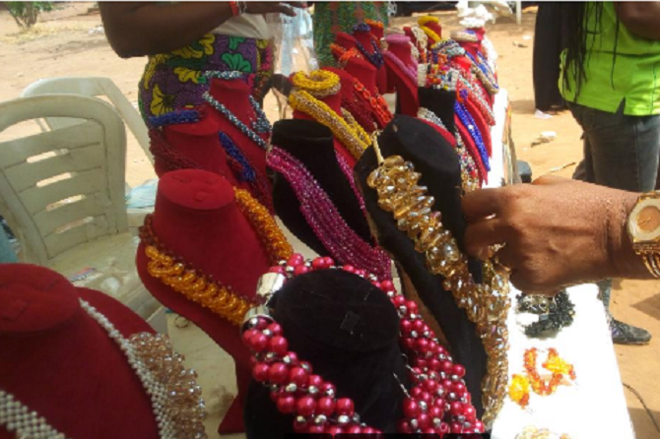Women key to breaking poverty
The graduation came after three weeks of daily study to learn tradecraft. Their craft are on display-germicide and antiseptic in plastic bottles, liquid soap in tubes, bleach in white packaging—and beads adorning mannequin necks. All are labelled, on display, ready for market. In Durumi, a slum inner city neighbourhood of Abuja, 40 women and girls […]


The graduation came after three weeks of daily study to learn tradecraft. Their craft are on display-germicide and antiseptic in plastic bottles, liquid soap in tubes, bleach in white packaging—and beads adorning mannequin necks. All are labelled, on display, ready for market.
In Durumi, a slum inner city neighbourhood of Abuja, 40 women and girls graduated the class, but only 30 got starter packs to help them continue. None has more than that.
Lots of women undergo training to acquire skills and business ideas, but transforming the ideas into sustainable business is a challenge. Lack of financial literacy means many women have no access to market information and even have no awareness what pivotal role they play in business.
With some knowledge, women are striving to be empowered.
“Smart economies include women and their role in communities,” said Njide Nwabukwu, of development finance at Central Bank of Nigeria.
“When you empower women, the family, community and society are better off. When women support men and do something and bring income to the family, you see there’s a difference.
“We are open to discussions on how the group of women who have undergone this training can access any of our funds and from there we will take the discussion further,” she told the women.
Dorcas Ishaya, a leading woman in her community of Durumi, has gone through a couple of businesses before—from tuck trading to clothes dealing—but never formalised her business enterprise.
She is among the 40 women with new skills now looking for finance—and a way out of poverty.
“I have the knowledge, I know what to do. My family cannot be poor again,” she says.
“It was not easy either, setting out and abiding by the criteria for the selection of those to be empowered, as all the participants demonstrated serious commitment,” said Selina Enyioha, executive director of Citizen’s Health, Education and Development Initiative, which trained the women.
Consequently, the CBN department responsible for supporting small-scale businesses is talking to women on “how to go about sourcing funds to start and sustain these skills,” said Enyioha.
The Medium and Small Scale Development Scheme is open to women, as is an entrepreneurship development fund to help institutions build capacity. But more importantly is the collateral registry, set up to break the hassles of securing land to be used as collateral for loans. It encourages people to use any item other than land for collateral.
Funding for the women’s training comes from staff at the World Bank, who contribute to a purse to finance their community connections campaign. The bank itself matches the staff contribution.
“The annual workplace giving programme of the World Bank Staff (WBS) is to support charities doing good work in our communities in developing countries all over the world to eradicate poverty and boost prosperity,” said Gloria Joseph-Raji, representative of WBS
Nigeria joined in for the first time and chose Durumi and another community in Lagos.
At least 1,000 communities like Durumi exist in Nigeria’s capital, and creating and sustaining small scale enterprise is vital to shift from “consumption to production,” said Matthew Ashikeni, executive secretary of the National Primary Health Care Development Agency.
“By empowering the women, we have not only created jobs for them but helping their families break out of poverty,” he said.
